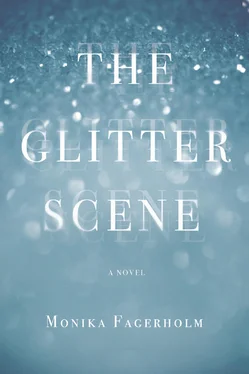And it had been good, nothing special about that either. She was used to old people, liked old people. But then, as said, she called her mother at home one day as she had a habit of doing and Maj-Gun answered the phone. It perplexed her, she hung up. She called again a few minutes later. Maj-Gun on the phone that time too.
“Where are you?”
“I’ll be on the first ferry.”
Maj-Gun’s voice, calm and resolute: “Give me the date and time and I’ll meet you at the terminal.”
She met Maj-Gun there at the terminal because they had set up the meeting on the telephone, not because she wanted to pull the wool over someone’s eyes on purpose.
In reality she was coming from somewhere else, much closer. But she stood there at the terminal and made it look like she had come with the morning ferry. Brand-new backpack, Fjällräven, on her back.
“Your mother is dead. You didn’t make it to the funeral. My deepest condolences—”
She had been living in another city, in other places. Would have been too complicated to explain. On the other hand, explain to Maj-Gun, why did she have to do that?
“It’s not that bad, Susette.” But there in the night in the rain at the cemetery as if she suddenly heard her mother’s voice, she does not of course, not really, but—
If you later come to wander in the valley of the shadow of death no harm will befall you .
And about the cemetery: “But, Susette, it will surely be fine here too.”
Now, it is crystal clear. Her mother was not, had never been angry at her.
And when she had left home, not “run away,” because of the strawberry-picking fields—how her mother had come into her room at night and kissed her on the forehead.
That kiss remained as well (Susette could almost feel it, in the rain, with her fingers).
“It will surely be fine here too.”
And Susette cries a little, her own tears, just her own. Peaceful crying at the cemetery and then she walks quietly back to her new apartment in the apartment complex above the town center.
Does not need Maj-Gun anymore.
Several weeks after the visit to the movie theater, when Maj-Gun notices that Susette has pulled away, for example never has time to talk on the phone when she calls, retreats rather quickly. Stops getting in touch, stops suggesting a lot of things. “Don’t we need to get out and get some fresh air?
And so has it become, without any accusations or talk of betrayal. And Susette gradually also realizes where Maj-Gun is living: as a boarder in another family home in the lush suburbs below the town center.
•
But then, it is seven–eight years until the summer of 1989 when Susette Packlén and Maj-Gun Maalamaa become friends again. Or if not friends exactly at least they start hanging out a bit again. In and of itself: they have not exactly lost sight of each other completely or anything during the time in between. During the years that have passed Maj-Gun Maalamaa remained sitting at the newsstand up in the town center. In the end she did not head off anywhere, neither to the admission interviews for various educational institutions nor to any other places. No. Sat where she sat.
“Sitting where I’m sitting.” That is how she expresses it herself as well, an answer to a silent question Susette never asks her in the years that pass when they only exchange a few words about ordinary things in the newsstand when Susette is buying candy and chips when she gets cravings in the evenings.
Maj-Gun at the newsstand, behind the counter, the postcard on the cash register. Today is the first day of the rest of your life . Worn text, once a glittery silver? Buckled letters on a grayish-blue landscape, rather abstract. Moonlight, spruce forest.
An explicitness, in other words?
Oh! Susette does not think like that either. During those years when she sees Maj-Gun in the newsstand sometimes she does not think very much at all.
Maj-Gun, a doughnut on a tall, three-legged stool on the other side of the counter, the pork pouring over the edges of the stool: one obvious fact is that as Maj-Gun gets older, she puts on a considerable amount of weight.
And: she has started smoking. A particular brand of cigarette, which she also makes a big fuss about with her customers. How unusual the brand is, so unusual that it is not part of the ordinary selection but needs to be specially ordered from a place, the “Head Office” in the city by the sea from where all of the newsstands in the country are centrally run, something you can also hear her explain with authority in her voice, to whoever happens to be at the newsstand and will listen.
Maj-Gun standing, puffing on her cigarettes in the doorway of the newsstand, which is eventually turned into a small room with a window facing the square:
“Had to fight with the Head Office but at least NOW I won’t get varicose veins until I turn thirty. Won’t you be thirty soon, Susette?” she asks, if Susette is the only one there, but as if in passing, without waiting for an answer.
“Djeessus, Susette!” Maj-Gun sighs, whistling between her two front teeth. “The Head Office!”
Djessus . Remains in Susette’s head for a little while on her way home.
Maj-Gun rolling her eyes, at the newsstand, “djeessus” this, that, and the other.
Maj-Gun on the three-legged stool, beads of sweat along her hairline, like an old woman.
Evaporated a few seconds later—gone.
•
It is sometime during the summer of 1989 that Susette Packlén starts seeking out Maj-Gun at the newsstand again, more than just as a random customer. In some way expressly to see Maj-Gun, talk about this and that, pass the time. And she often stays there, hanging out. Perched on another stool, “the customer’s stool” as Maj-Gun calls it, a little off to the side of the counter behind which Maj-Gun herself is sitting. Or rather, standing in the doorway, as a smoking buddy.
Even though she really does not want to, or maybe that is the wrong way to say it because it is only when she is actually in the newsstand, listening to Maj-Gun talking the hind leg off a donkey (and it is always Maj-Gun who is jabbering away, Susette who is listening), that she simultaneously in some way regrets having come, almost does not understand why she is there, longs to get away from there.
But then again tearing yourself away without hurting Maj-Gun is not that simple.
Tearing yourself away at all. Which is a rather strange feeling.
And she would not have time of course. A bit later, in the fall, she gets a cat too, a white, long-haired abandoned summer cat from one of the houses she cleans, the beautiful Glass House on the Second Cape. Only partially purebred, has difficulty taking care of its coat properly, needs to be brushed regularly every day. And still quite the kitten: starved for attention.
And thus, of course, there is the cleaning during the day with Solveig. Susette likes her job, that is not it—just you get tired of being on your feet all day long, it sucks the energy out of you sometimes. And this particular summer and fall of 1989, Solveig has taken on, for her part and the company’s, the final cleaning for the newly built residential area Rosengården 2 in the woods rather close to the Outer Marsh where Solveig lives, though to the south, closer to the sea. But still, far too much work for just two people, especially if there are already signed contracts for other places. Joint projects where Solveig and Susette regularly clean together, and individual ones, where each cleans on her own. During the summer, Susette has, for example, been busy with the summer guests on the Second Cape as well; they need to have cleaning done by the company that has been her special area of responsibility for a long time. Such as the Glass House, being rented by a French diplomatic family: mother, father, and three children, two boys and a girl in their early teens, who have a habit of making music together on the veranda—the Winter Garden—in the evenings. A complete small chamber orchestra where all of the members are dressed in the same long red- or blue-and-white-stripped polyester blouses, the evening dress that they change into every evening around six o’clock, a domestic design from the best brand—but still… as if they were sitting there on the veranda in their pajamas, playing calming classical pieces, the sea behind them, wild, in revolt because it is very windy that summer.
Читать дальше











